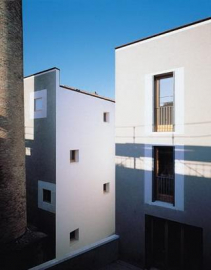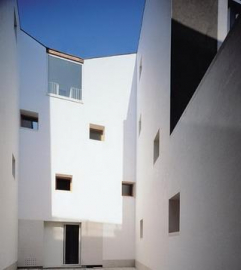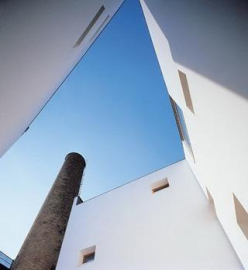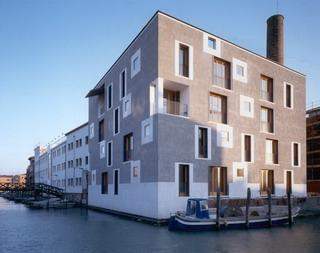Apartment Building D, Giudecca
This building is part of a large urban renewal plan on the site of the former Junghans industrial plant on the island of the Giudecca. The general urban scheme, implemented on the basis of the results of a closed competition won by the author, acts as a sort of microsurgery within the delicate body of the city with the construction of a new urban fabric and the renovation of existing industrial buildings converted to residential use. The D building is a new construction which substitutes an utilitarian building on the corner between two canals.
The materials and the technical solutions of the building are very traditional and the details of their use reveal the impossibility of an historicist replica. The façades have only three kinds of window openings and their irregular disposition follows the varying floor plans of the apartments in a search for glimpses of the Redentore apse, the canals and the Laguna. The traditional plain white stone window corniche of the minor historical Venetian architecture is changed in proportion and transfigured into a graphic motif and the crowning of the perimeter walls hides the gable roof required by the local regulations, reconducting the volume to an abstract image which is doubled by the reflection in the canal waters.
Beside its specific attributes generated by the very constrained technical and economical reality of subsidised housing, the project is trying to establish a contemporary attitude toward our urban landscape, which treasures the spatial and formal innovations of the Modern Movement without being trapped into its Sachlichkeit moralisms.
If Walter Benjamin prophetically understood the complex relationships between high-brow and popular culture in the age of technical reproduction, one wonders about the possibilities of contemporary architecture to employ the resonances of the well-known and the banal without falling into the pastiches of commercial architecture which is transforming the whole world into a commodified skin-deep image. The resistance to urban kitsch, at least in Venice, cannot take the simple forms of structural honesty or adopt fashionable avant-garde attitudes, but forces us to question again the problems of modernity versus permanence and individuality versus the collective artifact of the city.

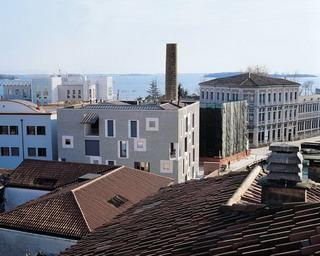 © Cino Zucchi
© Cino Zucchi
